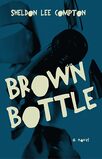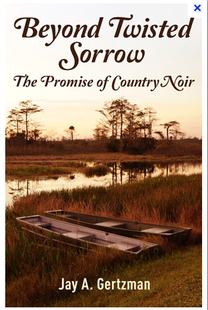

On Sheldon Lee Compton’s novel Brown Bottle
From Jay Gertzman’s Beyond Twisted Sorrow: The Promise of Country Noir
(available from Down & Out Book)
Wade (“Brown Bottle”) Taylor is an alcoholic living in the mountains of eastern Kentucky, the “prescription pain capital of the United States.” He had an abusive father and was not able, despite all his efforts, to protect his mother and sister from abuse. Sensitive to kindness when he sees it in others, Wade has resolved to protect his nephew Nick, who’s “into bad,” from immersion in the drug and alcohol culture of the town of Sandy. It centers on oxycontin or Meth, a desperately felt need for young people because they have little prospect of independent, proud, and useful lives. The culture, or habitus, of the area has in the past provided a code of loyalty honed by friendships of long standing, and family traditions of bestowing farm land or stable support businesses on sons and daughters. Those days are over, due to agribusiness’ replacement of those farm and town traditions. Young people, some suffering PTSD after forced re-ups to fight their countries’ endless oil wars, have been fighting, stealing, drinking, and growing pot to anesthetize themselves from “the way things are.”
Sandy’s natives harbor a lot of self-limiting resignation and suppressed anger. This is not the case with “Brown” (as people derisively call him). The saddest part of his story is that his deep love for his family has made it necessary to blunt his lack of direction with booze. But he’s through with drinking, for Nick’s sake.
He thus is at odds with Tuck Collins, the local drug supplier, who is protected by his savvy brother Stan, the town’s car mechanic, and his wife Hen (her father stubbornly expected a son, to be named Henry; “Strange Daddy”). When a state trooper shows up at Stan’s while Nick is sleeping off a cocaine snort, Stan draws the law’s attention away from Tuck by turning an addled Nick over to the oddly uninquisitive cop, who had to know Tuck’s reputation. Brown proceeds to remedy the injustice—not Stan’s protection of his own brother, but Tuck’s drug business. Threats, fights, and gunplay follow. Why would Wade choose these tactics? For the same reason the urban poor in Jim Thompson’s, Charles Williams’, James M Cain’s, or Dorothy Hughes’ books do: stubbornness rooted in lack of resources that might teach them effective, but devious, ways of dealing with people. There’s another factor: the concept of raw courage and elementary fair play
From Jay Gertzman’s Beyond Twisted Sorrow: The Promise of Country Noir
(available from Down & Out Book)
Wade (“Brown Bottle”) Taylor is an alcoholic living in the mountains of eastern Kentucky, the “prescription pain capital of the United States.” He had an abusive father and was not able, despite all his efforts, to protect his mother and sister from abuse. Sensitive to kindness when he sees it in others, Wade has resolved to protect his nephew Nick, who’s “into bad,” from immersion in the drug and alcohol culture of the town of Sandy. It centers on oxycontin or Meth, a desperately felt need for young people because they have little prospect of independent, proud, and useful lives. The culture, or habitus, of the area has in the past provided a code of loyalty honed by friendships of long standing, and family traditions of bestowing farm land or stable support businesses on sons and daughters. Those days are over, due to agribusiness’ replacement of those farm and town traditions. Young people, some suffering PTSD after forced re-ups to fight their countries’ endless oil wars, have been fighting, stealing, drinking, and growing pot to anesthetize themselves from “the way things are.”
Sandy’s natives harbor a lot of self-limiting resignation and suppressed anger. This is not the case with “Brown” (as people derisively call him). The saddest part of his story is that his deep love for his family has made it necessary to blunt his lack of direction with booze. But he’s through with drinking, for Nick’s sake.
He thus is at odds with Tuck Collins, the local drug supplier, who is protected by his savvy brother Stan, the town’s car mechanic, and his wife Hen (her father stubbornly expected a son, to be named Henry; “Strange Daddy”). When a state trooper shows up at Stan’s while Nick is sleeping off a cocaine snort, Stan draws the law’s attention away from Tuck by turning an addled Nick over to the oddly uninquisitive cop, who had to know Tuck’s reputation. Brown proceeds to remedy the injustice—not Stan’s protection of his own brother, but Tuck’s drug business. Threats, fights, and gunplay follow. Why would Wade choose these tactics? For the same reason the urban poor in Jim Thompson’s, Charles Williams’, James M Cain’s, or Dorothy Hughes’ books do: stubbornness rooted in lack of resources that might teach them effective, but devious, ways of dealing with people. There’s another factor: the concept of raw courage and elementary fair play